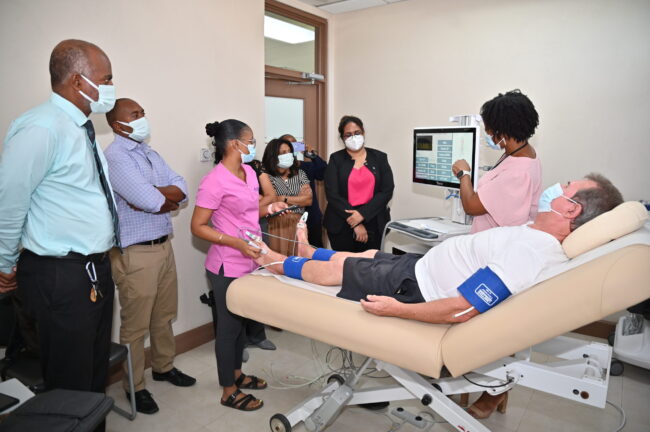Barbados Diabetes Foundation Launches Vascular Screening Program Amid Rising Cases of Peripheral Artery Disease in Younger Population

September 20, 2023
The Barbados Diabetes Foundation has launched a national screening program to detect vascular issues in people with non-communicable diseases. Screening takes 20-30 minutes and costs $100. Contact [email protected] for more information.
By Sheria Brathwaite
The Barbados Diabetes Foundation has launched a new programme aimed at detecting vascular issues that could further deteriorate the health of people living with non-communicable diseases (NCDs).
During a launch ceremony on Tuesday at the Maria Holder Diabetes Centre in Warrens, St Michael, consultant physician and clinical director at the foundation Dr Diane Brathwaite told the media that the foundation acquired an Ankle-Brachial Index (ABI) machine to screen for vascular diseases more than a year ago and after intensive training, it was ready to roll out a national screening programme.
Having an NCD such as diabetes can increase the risk of developing atherosclerosis, which occurs when arteries harden or narrow from a build-up of plaque. People who have diabetes are also more at risk of getting a vascular disease because their blood sugar levels can be poorly controlled.
Dr Brathwaite said it was recommended for people over the age of 50 with diabetes or hypertension to have a vascular screening as part of their regular health checks. She added that younger people who have had an NCD for more than ten years should also get screened, as well as other people, especially young men, who smoke often and those who have a family history of NCDs.
“Another important point is that in our population in Barbados and the Caribbean, for some reason we are seeing severe peripheral artery disease in people at younger ages and when you have diabetes, that peripheral artery disease (PAD) can be very extensive. It means that it doesn’t block off one segment but it blocks off the whole length of the artery.
“Rates of arterial insufficiency are relatively high in the ulcer patients that we see here. We just did an audit and PAD was present in about 60 per cent of our patients with diabetic ulcers so we advised all of our patients who come for ulcers, to do screening,” Dr Brathwaite said.
She said screening would take about 20 to 30 minutes and it was not painful. If an individual is symptomatic, a management treatment would be prescribed; and if a person was in critical condition, they would be referred to the vascular unit at the Queen Elizabeth Hospital (QEH) for further evaluation.
A vascular check should be done yearly and the centre screens for a fee of $100.
Senior medical officer responsible for NCDs with the Ministry of Health Dr Arthur Phillips said the partnership between the QEH and the diabetes foundation since 2014 has borne fruitful results over the years.
He said the hospital financed the care of about 225 people annually and they received six to nine months of care.
[email protected]


